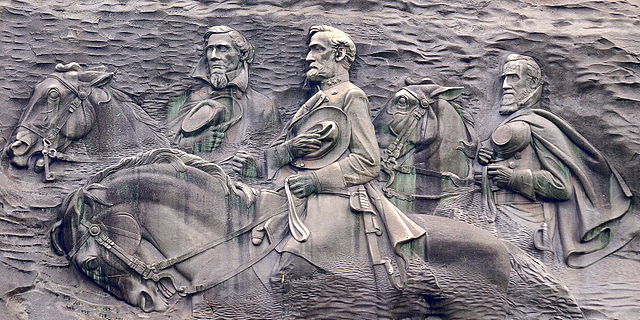When I was a teenager, I went to a meeting of the new Sons of Confederate Veterans chapter in my home town. I quickly became caught up in the ideals of the SCV and hoped desperately that I could find a Confederate soldier within my lineage so I could join.
I was not racist thanks to a good upbringing, nor were many of the SCV members in my home town. The head of the chapter made it clear to newcomers that racism would not be tolerated in any way, shape, or form. Despite this fact, we were nevertheless engaged in downplaying the atrocity of slavery to reconcile our past and defend our identity as southerners.
In our shallow minded understandings, we believed the war was about classism and freedom from oppression, arguing that the south was fighting over interpretations of the Constitution regarding states’ rights. By being a part of the SCV, I thought I was honoring the tens of thousands of poor southern farmers who fought to defend their families against “northern aggression.” I repeated statements I’d heard about Lincoln’s own racism, along with other facts contrasting the purely social justice narrative we saw as being taught about the war.
While there were many truths to these statements, some of which is evidenced by the present-day institutionalized racism in our country, I was still being ignorant and narrow-minded. As the years have gone by, I’ve come to understand many more truths about the war, and how deeply vested interests continue to manipulate and use southern pride for their own benefit.
The War
In the antebellum south, 25% of the population was rich enough to own slaves and consisted of plantation owners and business elites. Of those, only 3% of them owned more than 20 slaves. The remaining 75% of southern whites were often very poor, trying to survive in an economy flooded with cheap goods sourced and manufactured using slave labor. When the wealthy elites saw their economic advantage being threatened by government regulations, they created and raised the confederate flag. They began speaking of “states’ rights,” but make no mistake about it, the rights they sought to protect were those that allowed them to maintain lucrative profit margins generated by slave labor.1
They were despicable racists who used the color of people’s skin to treat them like animals with unimaginable cruelty, forcing them to do the work they didn’t want to do so they could build bigger homes and enjoy more refinements than any poor southern farmer could ever dream of having.
Why then, would poor, subsistence farming southerners, fight to help them? Wealthy Confederate aristocrats understood the values of the rural working classes just enough to tap into their sense of pride, heritage, and defensiveness against urban ridicule that came predominantly from northern states. The denial of education to poor southern whites became just as much a method of controlling political will as it was controlling the minds of their slaves. They knew just how to misinform the general public, leading people to believe that their way of life was being threatened—that the wealthy northern elites and abolitionists were trying to tell them how they should live. Fear mongering among a populace unable to think critically, resulted in battlefields soaked with the blood of poor southern farmers.
In all truth, Southerners should feel a deep burning hatred towards the Confederate flag and the rich aristocrats who brought it into existence. They should denounce the wealthy business elites who adorned themselves with military titles and marched thousands upon thousands of men and young boys to their deaths for a terrible and unjust cause. But many do not. The tactics used by economic and political forces in the antebellum south are still being used to manipulate people today.
Here We Go Again
Today, wealthy political groups, driven by corporate interests, are still speaking directly to rural people and lifting up our values. They feed upon the deeply rooted defensiveness that has been embedded in our DNA, one created by a millennia’s worth of judgment from a society wrought with the ills of classism and materialism. They fire up their propaganda machines and engage in fear mongering, telling us, “Big government is trying to tell you how to live and what to do.” With our rural values firmly acculturated, they begin framing everything as liberal vs. conservative, rural vs. urban, pro-life vs. pro-choice, constantly blurring the lines of truth, morality, and what it means to be free. They wield populism so well, that millions of people are basing their political beliefs less on the ethics of policy, and more upon their personally held prejudices against those falling outside of their own demographics. ‘Northern Elites’ are now ‘Democrats’ and the ‘Liberal Media.’ ‘Abolitionists’ are now ‘Communists,’ ‘Tree Huggers,’ and ‘Feminists.’
At the same time, no one is addressing the sources of polarization and defensiveness found within rural communities. Southerners are still depicted as slack jawed idiots by the media. It remains socially acceptable to stereotype us as rednecks, hillbillies, and white trash. I’ve had it happen to me personally. More than once my accent has caused people in urban areas (especially the north) to treat me as if I’m an idiot. Each time I become angry and begin self-justifying, “At least I can fix my own vehicles and I know how to take care of my family beyond just earning a paycheck and making trips to the grocery store.”
No one likes to be demeaned and I am not immune to the sting of prejudice. But in the end, I realize our differences, forgive people’s short-sightedness, and set to work finding common ground that will help us work towards fixing the bigger problems we all face. Not everyone can be helped, but we can’t give up hope based on those few.
Liberals and conservatives, rural and urban, we all need to understand the parts we play and how powerful interests manipulate us based on our cultural identity, be it where we are from, how we live, or the color of our skin. The hatred we are seeing is only the symptom of a much larger problem, one that Martin Luther King, Jr began to realize and fight against—a classist economic system that divides and oppresses all but the wealthiest of our nation. There is much work to be done and we must be engaged on all fronts, beginning with ourselves and within our own communities.
- One only need to read Vice President of the Confederacy Alexander Stephen’s “Cornerstone Speech.” ↩︎

